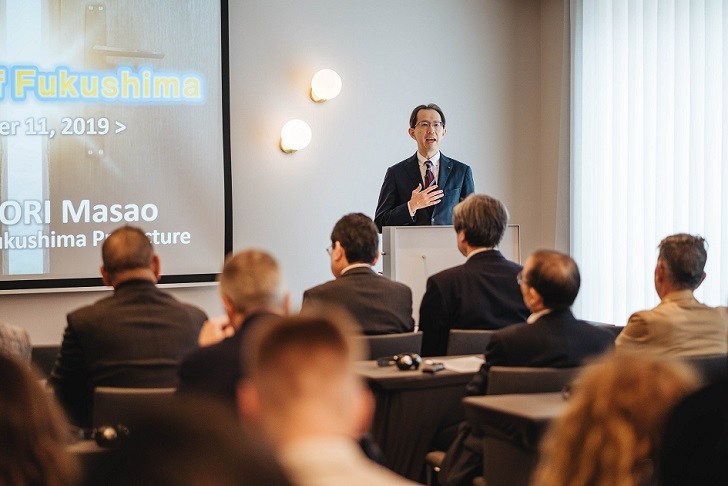After the Great East Japan Earthquake and the nuclear accident that followed on 11 March 2011 in Fukushima Prefecture, Japan and the Fukushima region suffered greatly not only from the destruction of their living environment, but also from the damage done to their economy.
The country and the Fukushima Prefectural Government have been working diligently to revitalise the industries and tourism in the prefecture, as well as recover people’s living environments ever since, and with great results.
The living environments in Fukushima have almost entirely been restored, and efforts are still continuing to foster and accumulate new industries that sometimes even exceed those that existed before the earthquake. The Governor of Fukushima, Mr Masao Uchibori, came to Brussels to speak about the future of Fukushima Prefecture.
“A very strong negative image of Fukushima is still deep-rooted among many people in Europe, and in the world,” said Mr Uchibori. “Due to the nuclear accident from over eight years ago now, many people have a negative image of our Prefecture and misunderstand what we are. That is why I came to Brussels now, to communicate what we are truly like in Fukushima,” the governor told The Brussels Times.
Revitalising tourism
The Prefecture is continuing to work on revitalising its tourism. The numbers of foreign tourists staying in Fukushima are growing, even beyond the point they were before the disaster. In 2010, 87,170 tourists stayed at least one night in the Prefecture. After the earthquake a year later, the numbers dropped significantly. However, the foreign tourism numbers have steadily been climbing in recent years and even reached a record high of 141,350 in 2018, which is a 162% increase compared to 2010.
The website of Fukushima Prefecture has helped a lot in that regard, according to Governor Uchibori. “As one of our measures to boost tourism, we have a website that can be read in more than ten languages, so we can communicate directly with potential tourists about what and who we are,” said the governor. “We also utilise text messages, Facebook, Twitter and Youtube videos. We have also invited people who work in the media, so they can film and show Fukushima how they experience it in their home countries. Through all of those channels, interested parties can learn all about Fukushima,” he added.
Olympic and Paralympic Games
However, the biggest project which will attract many tourists has yet to come. “The most important project is coming to us next year. In the spring of 2020, Japan is organising the Tokyo Olympic and Paralympic Games,” said Mr Uchibori. “Fukushima will host seven games of baseball and softball, as well as both the baseball and softball opening games. I am sure that the visitors of the Olympic Games and the mass media from all over the world will pay attention to Fukushima then, and many people will be surprised to see games being played in the beautiful locations in Fukushima through television, newspapers and the internet,” he said.
Due to Fukushima’s rich environment, the Prefecture has the right conditions for a variety of agricultural products. The prefecture has chosen eleven products such as vegetables, rice, Nameko mushrooms, flounder and sake for a special promotion as the ‘Fukushima Eleven’. The Sake from the Prefecture has won the most gold awards, as many as 22 different Sake brands, for a total of nine years, seven of which in a row, at the Annual Japan Sake Awards.
Recovering exports
Like tourism in Fukushima, its export volume has also been recovering since the nuclear accident. Before the disaster, Fukushima’s agricultural exports totalled over 150 tonnes, but in 2011, that number dropped by about 90%. However, the government implemented thorough efforts to decontaminate the topsoil to remove the radioactive substances and instituted inspections to ensure the food was safe for people to consume.
Over time, countries and regions around the world have eased or lifted their restrictions on food imports from Fukushima, allowing for a record high of 217,847 tonnes of exports in 2018. As of December 2017, all 28 member nations of the European Union decided to lift the restrictions on imports of rice and some seafood from Fukushima Prefecture, but still require proof of testing for other import products.
The success of Fukushima’s growth after the nuclear accident is partly due to the Japanese fighting spirit, the commitment, and the readiness to fight, according to the Governor.
“We have to be strongly committed. The nuclear accident happened more than eight and a half years ago, but there are still so many misunderstandings regarding our prefecture. There are still a lot of wrong and harmful rumours going around. Getting rid of those misunderstandings and rumours takes many years, but we are committed to continuing our efforts,” said Mr. Uchibori.
“We have to keep communicating the right information. It does not matter how many years it is going to take,” he concluded.

